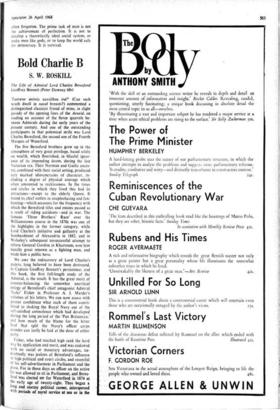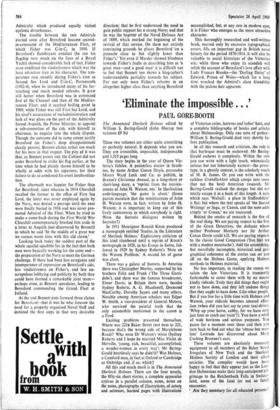Bold Charlie B
S. W. ROSKILL
The Life of Admiral Lord Charles Beresford Geoffrey Bennett (Peter Dawnay 60s)
'Tantame animis navalibus ire?' (Can such wrath dwell in naval breasts?) commented a distinguished classicist friend of mine, in slight parody of the opening lines of the Aeneid, on reading an account of the fierce quarrels be- tween Admirals during the early years of the present century. And one of the outstanding participants in that polemical strife was Lord Charles Beresford, the second son of the Fourth Marquis of Waterford.
The five Beresford brothers grew up in the atmosphere of very great privilege, based solely on wealth, which flourished, in blissful ignor- ance of its impending doom, during the late Victorian era. Their Norman and Gaelic ances- try, combined with their social setting, produced very marked idiosyncrasies of character, in- cluding a degree of physical courage which often amounted to -recklessness. In the times and circles in which they lived this had its attractions—except to the elderly Queen. It found its chief outlets in steeplechasing and fox- hunting—which accounts for the frequency with which the Beresford titles and estates passed as a result of riding accidents—and in war. The famous 'Three Brothers' Race' over the 'Williamstown course in the 1870s was one of the highlights in the former category, while Lord Charles's initiative and gallantry at the bombardment of Alexandria in 1882, and in Wolseley's subsequent unsuccessful attempt to relieve General Gordon in Khartoum, won him 'equally great renown as a fighting man, and 'made him a public hero.
We owe the rediscovery of Lord Charles's papers, long believed to have been destroyed, to Captain Geoffrey Bennett's persistence; and this book, the first full-length study of the Admiral, is the result. It has the great merit of counter-balancing the somewhat uncritical eulogy of Beresford's chief antagonist Admiral 'Jacky' Fisher in Professor A. 1. Marder's volumes of his letters. We can now assess with greater confidence what each of them contri- buted to shaking the Royal Navy out of the self-satisfied somnolence which had developed during the long period of the 'Pax Britannica; and how much of the blame for the bitter feud that split the Navy's officer corps asunder can justly be laid at the door of either party.
Fisher, who had reached high rank the hard Way by application and merit, and was endowed with no social or monetary advantages, un- doubtedly was jealous. of Beresford's influence in high political and court circles, and resentful of his self-advertisement in Parliament and the press. For in those days an officer on the active list was allowed to sit in Parliament, and Beres- ford was elected MP for Waterford in 1874 at the early age of twenty-eight. Thus began a long and stormy political career, interspersed With periods of naval service at sea or in the Admiralty which produced equally violent cyclonic disturbances.
The trouble between the two Admirals started soon after Beresford became second- in-command of the Mediterranean Fleet, of which Fisher was C-in-C, in 1900. If Beresford's flamboyant conduct (he ran his flagship very much on the lines of a Royal Yacht) showed considerable lack of tact, Fisher soon exhibited the vindictiveness which was the least attractive trait in his character. The tem- perature rose steadily during Fisher's time as Second Sea Lord and C-in-C, Portsmouth (1902-4), when he introduced many of his far- reaching and much needed reforms. It grew still hotter when Beresford was in command first of the Channel and then of the Mediter- ranean Fleet; and it reached boiling point in 1909, while Fisher was still First Sea Lord, and his rival's accusations of maladministration and lack of war plans on the part of the Admiralty forced Asquith, the Prime Minister, to appoint a sub-committee of the CID, with himself as chairman, to enquire into the whole dispute. Though the outcome did to some extent justify Beresford (as Fisher's deep disappointment clearly proves), Bennett claims rather too much for his hero in that respect. The pity of it was that, as Bennett points out, the Cabinet did not order Beresford to strike his flag earlier, at the time when he had plainly shown himself to be wholly at odds with his superiors; for their failure to do so condoned his overt insubordina- tion.
The aftermath was happier for Fisher than for Beresford; since whereas in 1914 Churchill recalled the former to the office of First Sea Lord, the latter was never employed again by the Navy, was denied a peerage until the axes were finally buried in 1916 and was never pro- moted Admiral of the Fleet. When he tried to make a come-back during the First World War Churchill contemptuously brushed him aside in a letter to Asquith (not discovered by Bennett) in which he said 'In the middle of a great war we cannot waste time with this old clown.'
Looking back today the saddest part of the whole squalid squabble lies in the fact that both men were basically working for the same end— the preparation of the Navy to meet the German challenge. If there had been less arrogance and intemperance of expression on Beresford's side, less vindictiveness on Fisher's, and less un- scrupulous lobbying and publicity by both they could have formed a remarkable joint team— perhaps even, as Bennett speculates, leading to Beresford commanding the Grand Fleet at Jutland.
At the end Bennett puts forward three claims for Beresfurd—that it was he who foresaw the need for a properly organised Naval Staff and initiated the first steps in that very desirable direction; that he first understood the need to gain public support for a strong Navy; and that he was the begetter of the Naval Defence Act of 1889, which marked the beginning of the revival of that service. On these not entirely convincing grounds he places Beresford 'on a pinnacle close to but slightly lower than Fisher's.' Yet even if Marder showed blindness towards Fisher's faults in describing him as 'a great man—and a good man' it is difficult not to feel that Bennett too shows a biographer's understandable partiality towards his subject. For not only were Fisher's reforms in an altogether higher class than anything Beresford accomplished, but, at any rate in modern eyes, it is Fisher who emerges as the more attractive character.
This thoroughly researched and well-written book, marred only by excessive typographical errors, fills an important gap in British naval history for the period 1870-1914. It will also be valuable to social historians of the Victorian era; while those who enjoy its scandals will relish the account of Beresford's love affair with Lady Frances Brooke—the 'Darling Daisy' of Edward, Prince of Wales—which for a long time wrecked the Admiral's close friendship with the jealous heir apparent.







































 Previous page
Previous page